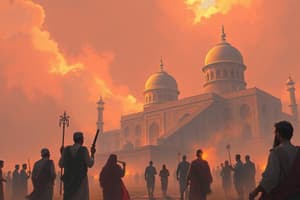Podcast
Questions and Answers
What is the primary function of the Indian Constitution?
What is the primary function of the Indian Constitution?
- Ensuring the smooth functioning of the government
- Maintaining trust among diverse people
- Protecting the rights of citizens
- Outlining the role of the government (correct)
How has the Indian Constitution helped foster democracy?
How has the Indian Constitution helped foster democracy?
- By limiting the power of the government
- By advocating for a monarchy
- By restricting citizen rights
- By promoting the rule of law (correct)
What has the Indian Constitution been a guiding light for?
What has the Indian Constitution been a guiding light for?
- Promoting authoritarianism
- Evolution of democracy (correct)
- Limiting diversity
- Suppressing individual freedoms
Why is learning about the Indian Constitution important for Class 9 Civics students?
Why is learning about the Indian Constitution important for Class 9 Civics students?
Which aspect of society does the Indian Constitution primarily set rules for?
Which aspect of society does the Indian Constitution primarily set rules for?
In what way has the Indian Constitution helped protect citizens?
In what way has the Indian Constitution helped protect citizens?
What is the purpose of the Indian Constitution?
What is the purpose of the Indian Constitution?
Which of the following is NOT a category of Fundamental Rights in India?
Which of the following is NOT a category of Fundamental Rights in India?
What does the Right to Freedom protect?
What does the Right to Freedom protect?
Which Fundamental Right ensures access to courts for the protection of rights?
Which Fundamental Right ensures access to courts for the protection of rights?
Which category of Fundamental Rights prohibits forced labor and human trafficking?
Which category of Fundamental Rights prohibits forced labor and human trafficking?
What is the main function of Fundamental Rights in India?
What is the main function of Fundamental Rights in India?
Study Notes
Civics Class 9: Understanding the Indian Constitution and Fundamental Rights
Class 9 Civics dives into key aspects of India's political system, such as the Indian Constitution and the essential rights it grants to citizens. Here, we'll explore these crucial topics in depth.
The Indian Constitution
The Indian Constitution serves as the supreme legal document that lays down the foundation for our democratic system. It outlines the structure, powers, and functions of our government, including the separation of powers, the democratic rights of citizens, and the duties of elected representatives.
Fundamental Rights
Fundamental Rights form a core component of the Indian Constitution and are designed to protect the basic freedoms and liberties of all citizens. There are six main categories of fundamental rights:
- Right to Equality: Ensuring equal rights to all citizens, including ending the practice of untouchability in any form.
- Right to Freedom: Protecting the freedom of speech, expression, assembly, movement, and association.
- Right Against Exploitation: Prohibiting forced labor and human trafficking.
- Right to Freedom of Religion: Guaranteeing freedom of religion and cultural and educational rights.
- Right to Constitutional Remedies: Ensuring access to courts for the protection of fundamental rights and the enforcement of duties.
These rights are fundamental to our democratic system and are considered the basic feature of our Constitution.
The Importance of the Constitution
The Indian Constitution is vital for maintaining trust and coordination among diverse people, ensuring the smooth functioning of the government, and protecting the rights of citizens. It provides a framework for our democratic system, outlines the role of the government, and sets the rules for how our society functions.
Challenges and Benefits of the Constitution
Despite the challenges of implementing such a vast and complex document, the Indian Constitution has helped foster a strong democratic system, promote the rule of law, and protect the rights of citizens. Our Constitution has been a guiding light for the evolution of our democracy and has helped us overcome challenges in the past, including the struggle for independence and the challenges of a diverse and rapidly changing society.
Conclusion
In Class 9 Civics, students learn about the importance of the Indian Constitution and the fundamental rights it provides to citizens. By understanding these topics, students can better appreciate the democratic system and the rights and freedoms that they are entitled to as citizens of India.
References: Vedantu. (2023). CBSE Class 9 Political Science Revision Notes 2023-24. Retrieved from: https://www.vedantu.com/revision-notes/cbse-class-9-social-science-political-science-notes Byjus. (2023). CBSE Notes Class 9 Political Science (Democratic Politics-I). Retrieved from: https://byjus.com/cbse-notes/class-9-political-science/ GeeksforGeeks. (2023). CBSE Class 9 Political Science Revision Notes. Retrieved from: https://www.geeksforgeeks.org/cbse-class-9-political-science-notes/ NCERT. (n.d.). Chapter 1: What is Democracy? Why Democracy? Retrieved from: https://ncert.nic.in/textbook/pdf/iess401.pdf Byjus. (2023). NCERT Solutions for Class 9 Political Science (Civics) Updated for 2023-24 Exam. Retrieved from: https://byjus.com/ncert-solutions-class-9-social-science-political-science/
Studying That Suits You
Use AI to generate personalized quizzes and flashcards to suit your learning preferences.
Description
Explore the Indian Constitution and Fundamental Rights in Class 9 Civics, focusing on the structure, powers, and functions of the government, as well as the essential rights guaranteed to Indian citizens. Gain insight into the importance of the constitution, challenges, benefits, and its fundamental role in shaping India's democratic system.




